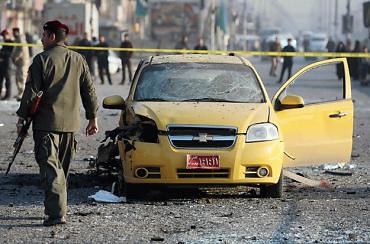
Aftermath of bombings in Baghdad where dozens were killed in renewed attacks. Since the US ostensibly withdrew nearly 450 have been killed., a photo by Pan-African News Wire File Photos on Flickr.
January 27, 2012
434 People Killed in Iraq Since U.S. Pulled Out
By MICHAEL S. SCHMIDT
New York Times
BAGHDAD — Since the United States military withdrew from Iraq in the middle of last month, 434 Iraqis have been killed in attacks across the country, according to security officials, one of the highest tolls for that amount of time in the past few years. The latest attack occurred Friday when a suicide bomber detonated a car filled with explosives near a funeral procession in a Shiite neighborhood. The procession was for a man who had been fatally shot, along with his wife and son, a day earlier by insurgents.
According to security officials, 31 people, including 8 police officers, were killed in the Friday attack and 60 were wounded. Elsewhere in Baghdad, a young boy was killed in an explosion near a soccer field.
It is difficult to make sweeping statements about security trends, and accounts about attacks and death tolls differ. Nevertheless, the wave of violence over the past five weeks has unnerved Iraqis who fear that their leaders, embroiled in a political fight with one another, are not prepared to thwart attacks without help from the Americans.
According to statistics compiled by the Ministry of Interior, the rate of deaths over the past month has been higher than all but one month last year. The average daily death toll since the withdrawal has been about 11. Last year, the average daily death toll was nine.
The attacks, which have been aimed mainly at Shiites, have also raised questions about whether the insurgent group Al Qaeda in Iraq has regained its footing after it was significantly diminished in 2008. In recent statements on its Web site, the group said it had shifted its attention toward those with close ties to Iran, particularly Iraq’s Shiites, in an effort to push back against Iran’s influence in Iraq in the wake of the American withdrawal.
Despite the carnage, top Iraqi security officials say their fight against insurgents is increasingly successful.
The acting minister of interior, Adnan al-Asadi, said in an interview here on Thursday that when the Americans were in Iraq they made the fight against Al Qaeda more difficult.
“It became better after the Americans left,” he said. “They were slowing our operations. Sometimes we would arrest a bad guy, and they would get involved and say, ‘That is our guy,’ and they would have him set free.”
The United States provided extensive support to Iraqi security forces in counterterrorism operations against Al Qaeda, including helicopter transportation for many of the raids to detain insurgents. Mr. Asadi said that even though the Iraqis no longer have that help, “Al Qaeda has received a number of hits, and we were able to arrest a large number of their leaders.”
“We are hitting them hard,” he added. “And we are arresting big numbers of them every day, sometimes as much as 50 a day.”
The recent wave of attacks, Mr. Asadi said, was “just to prove that they are still here.”
The attack on Friday occurred around 11 a.m., as the procession made its way past a market, taking the man’s body to be cleaned before being buried.
“The people in the market got hurt, there were women and children burning,” said a man who was part of the procession and who would identify himself only as Abu Hussein. “There were a lot of officers in the funeral procession.”
Abbas Munther, 32, was selling cigarettes on the street when “the explosion went off and I flew right into the air,” he said.
“I was blinded by the heavy smoke. I couldn’t see who was beside me,” said Mr. Munther, who sustained arm and head wounds. “Then I could hear the voices of injured people and the sirens of rescue vehicles. Later I saw the ground and it was full of body parts and blood."
On Thursday, 20 people were killed across Iraq, including a high-ranking member of the Awakening movement, which is made up of former Qaeda members who turned against the insurgents and helped the Americans and Iraqis fight them.
Zaid Thaker and Omar al-Jawoshy contributed reporting.
No comments:
Post a Comment